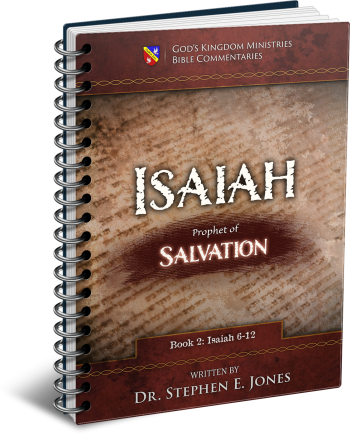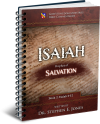Latest Posts
View the latest posts in an easy-to-read list format, with filtering options.

Isaiah is the prophet of Salvation. He is also known as the truly "Universalist" prophet, by which is meant that He makes it clear that salvation is extended equally to all nations and not just to Israel. He lived to see the fall of Israel and the deportation of the Israelites to Assyria, and he prophesied of their "return" to God (through repentance). He is truly a "major prophet" whose prophecies greatly influenced the Apostle Paul in the New Testament.
Category - Bible Commentaries

The Immanuel prophecy in Isaiah 7 came in the context of pronouncing divine judgment upon the land of Judah. The reason for this judgment was because Ahaz had appealed to Assyria for help. God Himself then raised up Assyria to judge Judah for its own foolishness and sin. If we put our trust in flesh, the flesh will judge us accordingly. The gods we worship become agents of divine judgment.
The prophecies of judgment spoken in the time of Ahaz were fulfilled in the time of his son, Hezekiah. Fortunately for Judah, Hezekiah was a godly king, so the worst of the judgment was postponed to a later time.
In Hezekiah’s time, Assyria conquered the land of Judah and deported most of the survivors to Assyria. All that was left was Jerusalem itself, which, though packed with refugees, could not hold enough people to repopulate much of the devastated land. Isaiah describes this desolation decades before the fact in the rest of Isaiah 7.
Isaiah 7:17 says,
17 The Lord will bring on you, on your people, and on your father’s house such days as have never come since the day that Ephraim separated from Judah, the king of Assyria.
The wording is better understood as “The Lord will bring on you… the king of Assyria.” Judah was to enter into an unprecedented time of trouble that had not been seen since the disastrous breach between Judah and Ephraim that occurred after the death of Solomon. Jesus used similar terminology in Matt. 24:21 in the context of the impending destruction of Jerusalem,
21 For then there will be a great tribulation, such as has not occurred since the beginning of the world until now, nor ever will.
The prophecies of Jerusalem’s tribulation and ultimate destruction were fulfilled partially in the past but at some point the city will be destroyed permanently (Jer. 19:10, 11). When we study the history of Jerusalem and Judah in light of the prophecies, we may view these past tribulations as types and shadows of what is to come in a greater way.
Hezekiah reluctantly appealed to God for help, and God spared Jerusalem in his day. A century later, the king of Jerusalem was ungodly and refused to hear the word of the Lord given through the prophet Jeremiah. For this reason, the city was taken by Nebuchadnezzar in 604 B.C., and later, when the city revolted against Babylon, it was fully destroyed, along with the temple of Solomon (586 B.C.)
Nonetheless, the city and a second temple were rebuilt, and this lasted until 70 A.D., when the Romans destroyed the city. The death and destruction in Jerusalem fulfilled Jesus’ prophecy about “a great tribulation,” but once again the city was rebuilt. The final fulfillment of all of these prophecies, then, must yet be future, along with this “great tribulation, such as has not occurred since the beginning of the world.”
This will not be a tribulation upon the whole world but upon Jerusalem. It will affect the land of Judah—today known as modern “Israel,” though misnamed to deceive the church into accepting the idea that the prophecies of the House of Israel are being fulfilled in the House of Judah.
See The Struggle for the Birthright.
One of the keys to understanding Bible prophecy is to distinguish between Judah and Israel—or, as Isaiah put it, the separation between Ephraim and Judah. From that point on, the prophets never confuse the two nations, for each had its peculiar calling and destiny.
Isaiah 7:18, 19 says,
18 In that day the Lord will whistle for the fly that is in the remotest part of the rivers of Egypt and for the bee that is in the land of Assyria. 19 They will all come and settle on the steep ravines, on the ledges of the cliffs, on all the thorn bushes and on all the watering places.
Egypt was known for its flies and Assyria for its bees. God claims both as divisions of His army, along with locusts (Joel 2:11). All of God’s creatures are at His command. So the prophet compares these tiny creatures to whole nations, who are also at God’s command. There is no evidence that Egypt invaded Judah in these years, but Assyria certainly did so.
In our time, Egypt and Assyria have become metaphors for oppressors or fleshly conquerors in general who are raised up by God to bring judgment upon a lawless and disobedient people. They are not necessarily to be taken literally when Jerusalem is destroyed in the future.
Isaiah also paints the picture of flies and bees settling in a land devoid of population, where “thorn bushes” are allowed to grow in the old pastureland.
Isaiah 7:20 says,
20 In that day the Lord will shave with a razor, hired from regions beyond the Euphrates (that is, with the king of Assyria), the head and the hair of the legs; and it will also remove the beard.
In those days a man’s beard was evidence of maturity, and gray hair and beard qualified a man as an elder to be respected (Lev. 19:32). Men often shaved their heads and beards in times of mourning for the dead.
Some today believe that men are commanded to grow their beards, and some insist that these may not even be trimmed or cut short. But a beard is compared to a crop that grows “on the face of the earth.” Crops are routinely harvested. Hence, beards too may be shaved.
The prohibition in Lev. 19:27 is on trimming “the side-growth” or “the edges of your beard.” This refers to one’s sideburns and is the reason for the Orthodox Jewish practice of allowing that part of the beard to grow long.
Sideburns, then, follow the law regarding the corners of one’s field, which are reserved for the widows, orphans, aliens, and others who have no covering (kinsman redeemer) to protect them and to provide for them. They represent the gleanings of the field or gleanings from the trees, all of which are devoted to God. Gleanings are reserved for those that He is protecting as their Kinsman Redeemer.
But just as there is no law commanding a man to cultivate a field on the face of the earth, so also there is no command to grow a beard on one’s face.
The reference in Isaiah 7:20 shows that God was going to shave the nation of Judah. The “razor” in this case was Assyria. Isaiah used this metaphor to show that the law of tribulation was being fulfilled in Lev. 26:16, where God says to the disobedient nation, “you will sow your seed uselessly, for your enemies will eat it up.” The beard signified one’s crop, and though Judah had sown this crop, Assyria would reap its benefits.
Again, Deut. 28:30 says, “you shall plant a vineyard, but you will not use its fruit.” Such is one of the laws of tribulation, which the prophet was applying to the House of Judah on account of the sin of Ahaz.
The Promised Land was very productive when Israel first took the land from the Canaanites. Moses told them in Deut. 8:7, 8,
7 For the Lord your God is bringing you into a good land, a land of brooks of water, of fountains and springs, flowing forth in valleys and hills; 8 a land of wheat and barley, of vines and fig trees and pomegranates, a land of olive oil and honey.
The physical productivity and fruitfulness of the land was supposed to be matched by the spiritual fruitfulness of God’s “vineyard” in Isaiah 5. However, because the caretakers of the vineyard had failed to bring forth the fruit that God required, the physical land itself was to become unproductive. Regarding His vineyard, God vowed to “lay it waste” (Isaiah 5:6) and cause it to bring forth “briars and thorns.” So also, the Assyrians were to destroy the land and fill it with “briars and thorns,” which prophetically represented idolatrous foreigners.
So in Numbers 33:55 Moses says,
55 But if you do not drive out the inhabitants of the land from before you, then it shall come about that those whom you let remain of them will become as pricks in your eyes and as thorns in your sides, and they will trouble you in the land in which you live.
The problem was not so much that they were foreigners but that they were idolaters and unbelievers. Ruth was a foreigner, but she was not a thorn in the side of her husband, Boaz. She was a blessing.
Isaiah uses the metaphor of briars and thorns to describe the unproductive land of idolaters. He begins with a description of poverty and poor pasturage in Isaiah 7:21, 22,
21 Now in that day a man may keep alive a heifer and a pair of sheep; 22 and because of the abundance of the milk produced he will eat curds, for everyone that is left within the land will eat curds and honey.
This was a picture of poverty, where all that a family might have left is one heifer and two sheep. Without crops, all they could eat was curds from the heifer and honey from the forest.
Isaiah 7:23 continues,
23 And it will come about in that day that every place where there used to be a thousand vines, valued at a thousand shekels of silver, will become briars and thorns.
The number 1000, in biblical numerology, indicates the glory of God. What should have been a productive “vineyard” that was producing the fruit of the Spirit that God desired, instead had become an unproductive field full of “briars and thorns,” that is, idolaters.
He was not just speaking of Assyrian idolaters but Judahite idolaters as well.
Isaiah 7:24, 25 concludes,
24 People will come there with bows and arrows because all the land will be briars and thorns. 25 As for all the hills which used to be cultivated with the hoe, you will not go there for fear of briars and thorns; but they will become a place for pasturing oxen and for sheep to trample.
All of this overgrowth of unproductive plants was to be understood on both physical and spiritual levels. The spiritual problem of the unfruitful vineyard in Isaiah 5 ultimately resulted in the physical desolation of the land of Judah that had been overrun with idolaters and unbelievers.
This is the description of the time of tribulation such as had not been seen since the separation of Judah and Israel.
We may also apply this to the future destruction of Judah that the prophet Jeremiah described in Jer. 19:11, when he said plainly that “I will break this people and this city as one breaks a potter’s vessel which cannot again be repaired.” It is not only the city but also the people (inhabitants of the city) who will be destroyed, just as this occurred in 70 A.D.
It is also the fate of the fruitless “fig tree” that Jesus cursed in Matt. 21:19. Though Jesus later said that this tree would come back to life and bear more leaves (Matt. 24:32). Thus, the greater destruction that Jeremiah prophesied was to be fulfilled at a future time on account of its fruitlessness.